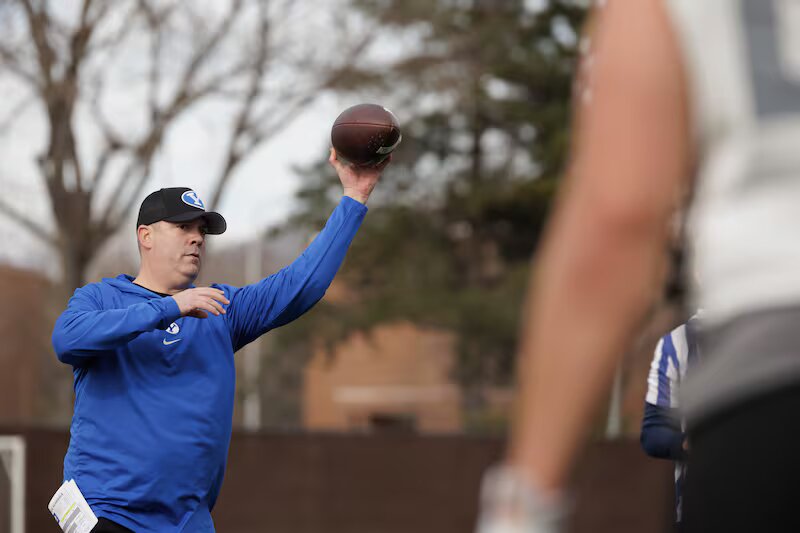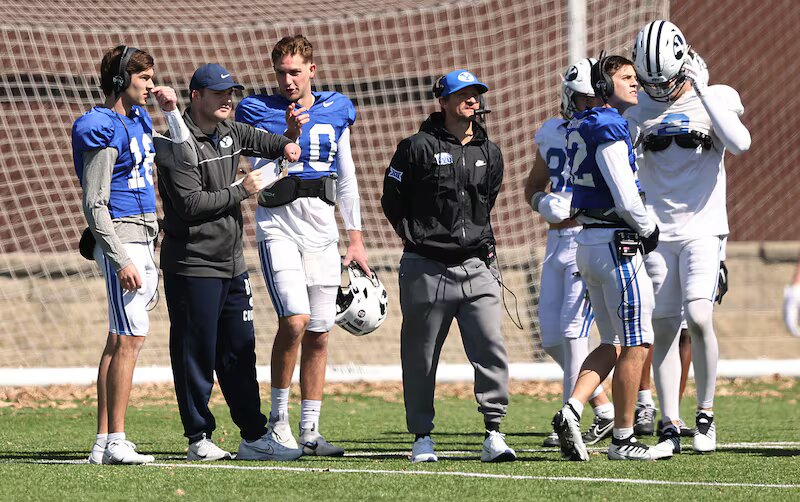BYU requires tight ends to take on greater responsibilities
New tight ends coach Kevin Gilbride was brought in to enhance and reinforce the tight ends room, and he appears to be well on his way.

Aaron Roderick may have something special planned for BYU’s offense this season.
He has to. In BYU’s first season in the Big 12, both the offense and defense struggled.
Roderick understands that if BYU wants to avoid being in the bottom half of the league standings this season, all hands must be on deck. Aside from finding a consistent, productive, and protected quarterback and run game, he needs to take the tight end corps to the next level.
BYU has a history of successfully recruiting and developing tight ends. This season, the Cougars will have two four-star recruits in Jackson Bowers and Ryner Swanson, but converted senior wide receiver Keanu Hill is anticipated to make a significant impact.
Of all the issues BYU’s offense will confront this season, the tight end position must be part of the solution.
Roderick also hired head coach Kalani Sitake’s longtime teammate, experienced NFL coach Kevin Gilbride, to coach the tight ends.
Gilbride, who has been out of college recruiting for over a decade, just secured pledges from three three-star tight ends in the class of 2025: Oregon’s Jackson Doman, Blake Bryce from Newberry Park, California, and Tucker Kelleher from Georgia.

Could someone describe it as an emphasis?
It is Gilbride’s responsibility to get Roderick some aid from the tight end room in 2024 and beyond.
After BYU’s second annual media day golf event at Cedar Hills on Monday, I questioned Gilbride about his tight end goals for the fall.
“The ability for us to play with multiple tight ends on the field and still be versatile with the pass and run game,” suggested Gilbride. “It is top of the list.”
Two? Three? A combination of the two, including a tight end in the slot or fullback position? Everything’s on the table.
Gilbride admits that it is not new at BYU. Remember how Itula Mili and Chad Lewis helped BYU win 14 games and the WAC championship in 1996? Back in the Max Hall era, Andrew George and Dennis Pitta were also widely deployed.
“It’s not necessarily unique in terms of what BYU has done in the past, but the tight ends we have now are versatile and can do a variety of things. The more depth they develop, the better we’ll be at confusing what the defense can focus on since multiple players can be deployed consistently across our formations.”
If a tight end is perceived on film as primarily a blocker, or if he is on the field and a defense believes he will be a downfield receiver on a throw route, those are important factors for a defense. Making players complex makes it more difficult to predict what’s going on with strategies.
Gilbride appreciates what he acquired from former coach Steve Clark.
“They are talented, No. 1, and good kids, No. 2,” he told me.
They have a positive growth attitude and are all about business.
“They aren’t backing away from things they’re not good at, but rather pushing themselves into the fire. They fail and get back up; they fail again and get back up, learning as they go. That is the growth mindset I preach in the room, and they have demonstrated and sustained it. If you give them that for a long time, they will progress and become better, which is what I enjoy about these men.”
Has Gilbride’s NFL past raised any eyebrows in the group?
“I don’t know if it’s my NFL background or not, but they have a growth mindset to improve and are willing to put themselves and their bodies in position to make it that way.”
Sitake said he’s been following Gilbride’s NFL coaching career for a time. Since they were teammates at BYU in the late 1990s, he was particularly interested in what he was doing and maintained in touch, occasionally calling him.
Sitake stated on Monday that there is a lot behind the scenes that reporters at spring practice did not see.
“You guys didn’t see anything in the spring, but if you talk to the guys they’ll tell you he made a significant and big difference with the knowledge he brings to that room,” according to Sitake.
“In the spring, we watched tight ends create plays we had never idea they could do. It’s a good bunch of young players, and Gilbride has done an excellent job; now it’s a matter of combining it with the rest of the offense and making it work.”
Sitake expressed excitement about Roderick’s deep and skilled wide receiver corps, which he expects to be productive.
“But it only works if you have a quarterback who can make the plays and an offensive line that can give him enough time to make those throws. We have to bring everything together, and that is our challenge this year.”
According to Gilbride, Sitake is making his return to the college game simple.
“I believe it would be more difficult to return to college football if it were at a different location. Kalani’s culture has diffused throughout the firm, making the move easier. The additional jobs you have in college make it difficult, but I’ve enjoyed it because of the people I’m working with and coaching.”




